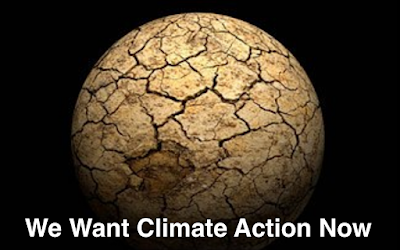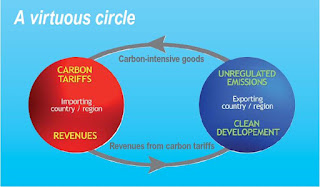(Pics by this blog)
Climate change is like a snowball effect, except, well, hot.
Why it matters: Like a snowball begins small and grows larger by building upon itself, numerous feedback loops embedded in our atmosphere and society are exacerbating climate change.
Driving the news: Scientists are well acquainted with feedback loops, but the often wonky topic doesn’t break through into the mainstream despite its importance to how much the world warms and how much we respond to that warming.
* This is an easy-to-understand feedback loop, but it’s not going to
have a
big impact on our emissions, says Zeke Hausfather, a climate scientist
at the research group Breakthrough Institute.
* The bigger impact is likely to be population growth in developing countries in hot parts of the world, like India, getting AC to survive their ever-hotter weather.
How it works: The atmosphere heats up as we emit heat-trapping greenhouse gases.
* This warmer air leads to more water evaporation from water
“Those decomposition processes emit greenhouse gases,” Duffy said.
 |
| We want climate action now. |
Climate change is like a snowball effect, except, well, hot.
Why it matters: Like a snowball begins small and grows larger by building upon itself, numerous feedback loops embedded in our atmosphere and society are exacerbating climate change.
Driving the news: Scientists are well acquainted with feedback loops, but the often wonky topic doesn’t break through into the mainstream despite its importance to how much the world warms and how much we respond to that warming.
- As we soak up the last of these hot summer days, and extreme weather hits parts of the country, today seems a fitting time to break this down for those of us without a Ph.D.
Air conditioning
How it works: Climate change is making our summers hotter, so we use more air conditioners, which emit greenhouse gases, which heats up our planet more, so we use even more AC, which heats up our planet even more ... You get the cycle.* This is an easy-to-understand feedback loop, but it’s not going to
 |
| Heatwaves will kill. |
* The bigger impact is likely to be population growth in developing countries in hot parts of the world, like India, getting AC to survive their ever-hotter weather.
Water evaporation
This one’s more technical but far more consequential for Earth’s temperature than the AC example.How it works: The atmosphere heats up as we emit heat-trapping greenhouse gases.
* This warmer air leads to more water evaporation from water
“Those decomposition processes emit greenhouse gases,” Duffy said.
* Scientists estimate that there's twice as much carbon locked up in permafrost as is already in the atmosphere, Duffy says. "The potential to amplify warming is huge.”
 |
| Melting Land Icesheets |
Albedo feedback
This is similar to permafrost. It’s why you feel hotter in black clothes compared to white clothes.How it works: Lighter surfaces reflect heat more, so as ice and other cold places get warmer (i.e., the Arctic and other permafrost), their ability to reflect heat diminishes and they soak up more heat.
- “As the world warms, expect a lot of ice and snow to melt, which uncovers darker surfaces, which will result in more warming,” said Hausfather.
Wildfires
How it works: Trees, by definition, embody carbon. So when |
| Californian Wildfires |
* As the world warms, temperatures get hotter and places get drier, creating tinderboxes for when wildfires do start.
* The hotter the world gets, the bigger wildfires will be (in some places like California), the more CO2 emitted into the atmosphere, which heats up the world more, which will exacerbate wildfires more ...
Policy and economic paralysis
Unlike most policy challenges, climate change gets worse the longer we take to address it.How it works: The longer we wait to address climate change with major government action, the bigger the policy needed and the bigger economic impact that policy will have.
- But the bigger the policy and economic hit get, the harder the politics get.
- So we wait longer still, making the required policy and economic impact ever bigger, which makes the politics even more difficult.
Geopolitics
 |
| Carbon tariffs require geopolitical agreements. |
- But if there's no global cooperation, climate change continues to get worse — prolonging the adverse impacts on different countries, and giving them even less incentive to cooperate with other countries and more incentive to act on their own.
“The possible scenario that is a real nightmare is if we don’t control human emissions, nature takes over and we lose control of the warming, because of these emissions from natural systems.”— Philip Duffy, climate scientist
By Amy Harder, author of Generate
Go to Axios
Related: East Antarctic Melting Hotspot Identified by Japanese Expedition – Ice Melting at Surprisingly Fast Rate: SciTechDaily
airconditioning, carbon tariffs, feedback loops, tipping points, permafrost, polar ice melt, #jailclimatecriminals,

No comments:
Post a Comment